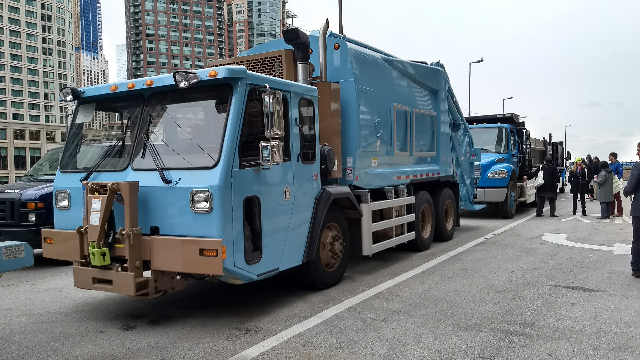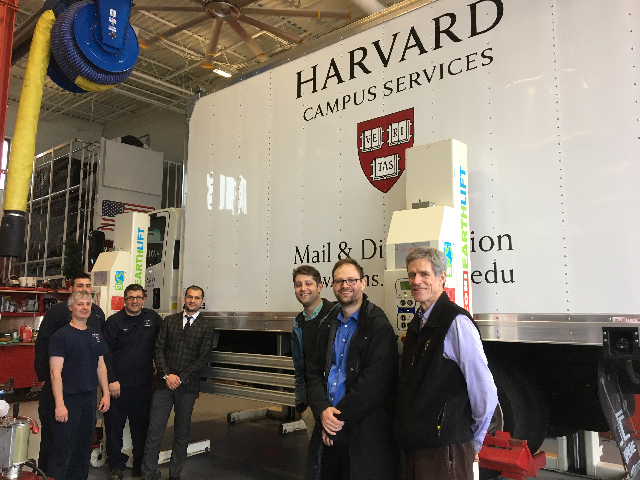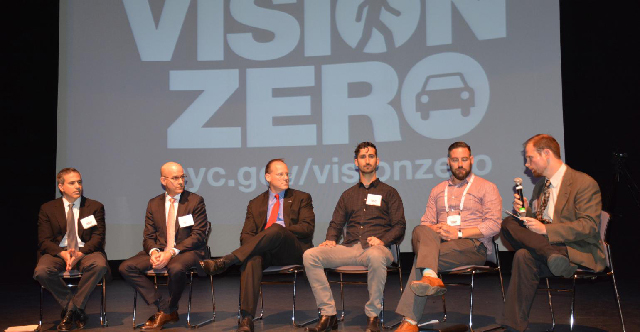Using technology to make city streets safer
Boston experienced five horrific bicycle fatalities in the summer and fall of 2012, raising awareness of the dangers involved when cyclists and trucks and buses navigate the city’s narrow streets.
Alumnus Alexander Epstein, then a new employee in the Office of Planning, Policy, and Environment at the Volpe National Transportation Systems Center, began working with Boston and other municipalities on ordinances requiring side guards on municipal trucks. The metal guards cover the exposed space between a truck’s front and rear wheels, keeping cyclists or pedestrians from being swept underneath the wheels and preventing one of the deadliest types of road crashes.
“I am starting to see more and more trucks with side guards out there on the road, which are pretty low tech devices that can mitigate crashes with people walking and biking,” said Epstein, who earned an S.M. in applied physics and a Ph.D. in engineering sciences at the Harvard John A. Paulson School of Engineering and Applied Sciences (SEAS.) “I get up in the morning motivated to go to work because I feel like I might actually improve the world a little bit.”

Epstein helped put together this demonstration of truck side guards for a national conference of city officials in Chicago in November, 2017. (Photo provided by Alexander Epstein.)
While the work is gratifying, it is a departure from his graduate studies at SEAS, which focused on materials science in the lab of Joanna Aizenberg, Amy Smith Berylson Professor of Materials Science and Professor of Chemistry and Chemical Biology. A New York City native and son of two engineers, Epstein’s problem-solving mindset drew him to the intricate puzzles of surface science.
He developed functional surfaces that were specially textured at the micro-organic scale, enabling them to prevent or mitigate bacterial fouling. Splitting time between the Aizenberg lab and the Department of Molecular and Cellular Biology, Epstein learned to speak the very different languages of the two disciplines.
“I liked that, with my research, I didn’t have to narrowly pigeonhole myself. There were many different applications to the work. It required some engineering know-how to design test rigs, but also enough biology to know how to get the specimens on there,” he said. “It really required me to coordinate and collaborate, and I have fun bringing ideas together rather than being the expert myself.”
As he delved deeper into his thesis research, Epstein also began exploring a lifelong passion: transportation. During his undergraduate training at Olin College, he had completed a senior thesis project to establish a bus service between his campus in Needham, Mass., and Wellesley and Babson colleges.
He enjoyed the scientific aspects of developing a timetable and optimizing service while still having a tangible impact on the lives of his fellow students. After a close family member was injured in a car crash, Epstein was inspired to join the Somerville Bicycle Advisory Committee in 2009, eventually becoming committee chair while completing his graduate studies.
Fascinated by complex transportation problems, he switched gears and looked toward a public sector career after graduation.
“No matter how we get around or how the goods we use get around, we all need and interact with our transportation system every day. Yet I feel there are problems with the current system that affect us all,” he said. “It is, on the whole, environmentally unsustainable, and as I once heard a professor put it, ‘If our traffic system were a private industry, it would be shut down tomorrow for gross violation of industrial safety standards.’ There are a lot of opportunities for improving transportation.”

Epstein (second from right) in 2017 at a pilot side guard installation at Harvard's Allston garage that he helped arrange. David Havelick, Sustainability Manager in the Office for Sustainability (to Epstein's left) and Rob Gogan, Recycling and Waste Manager in Operations Services (to Epstein's right) led the initiative at Harvard. (Photo provided by Alexander Epstein.)
After joining Volpe as an engineer in 2012, Epstein wasted no time tackling those improvements. In the organization’s energy division, he works on transportation sustainability and safety projects.
One recent project, in partnership with the National Association of City Transportation Officials, involves determining how large trucks can travel more safely through major cities. Epstein and his team are studying advanced technologies like automatic emergency braking and novel truck exterior designs that provide better visibility to drivers and pedestrians.
“We are developing some really cool best practice documents that cities are going to be able to use to make decisions about which vehicles they buy, and measures they can take to prevent deadly crashes on their streets,” he said. “I feel like we are on the cutting edge here, focusing on vulnerable road users who bear the brunt of these crashes in cities.”

Epstein (right) moderating a panel of experts on vehicle safety technology at the New York City Vision Zero Fleet Safety Forum in 2016. (Photo provided by Alexander Epstein.)
Epstein’s volunteer work with Somerville city government, as well as his experience as a go-between for engineers and biologists at SEAS, helps him build relationships with stakeholders and speak effectively about technical topics to non-engineers.
The public sector’s bureaucratic red tape sometimes presents challenges, he said. Working with clients, especially in other levels of government, can lead to roadblocks that Epstein must use soft skills, trust, and collaboration to overcome. But he enjoys the opportunity to cultivate projects he feels passionate about, and to find innovative ways for the latest technologies to improve people’s lives.
“Sometimes, we have to invent the tools that we use to solve the problem,” he said. “In other cases, it is not inventing a new tool, but thinking through scenarios that haven’t happened yet, like the types of automated trucks that might exist under the current regulatory landscape. Even more than keeping current, my work requires me to do thought experiments about what could happen and what it would mean. That keeps things pretty interesting.”